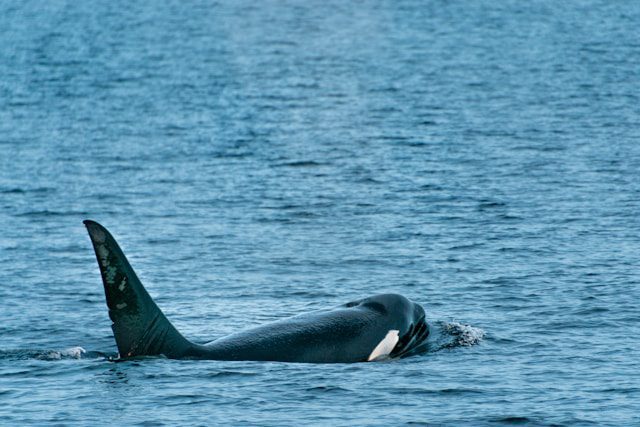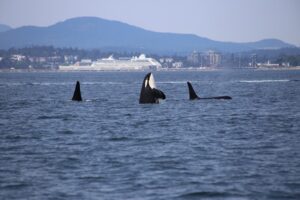World Ocean Day: Canada Needs to Deliver on Ocean Protection
June 5, 2024

The awe-inspiring kelp forests off the coast of British Columbia are feeding grounds for species like orca, sea otters, and salmon and once stretched for hundreds of kilometers. However, Canada prioritizes business over biodiversity and this vital ecosystem is under threat. Which begs the question, should Canada be celebrating World Ocean Day when they continue to jeopardize the ocean?
Cruise ship pollution is threatening endangered killer whales this World Ocean Day

World Ocean Day is a time to celebrate the magnificent animals that call the ocean their home. The Southern Resident Killer Whale is a very special population of orca that live in the coastal ocean waters off Northern California, Oregon, Washington, and British Columbia. These orcas are critically endangered, with only 75 individuals remaining as of December 2023. Each plume of scrubber waste dumped by ships is a silent threat to the future of orca families, jeopardizing their ability to hunt, communicate, and thrive.
What are scrubbers?
Scrubbers are a pollution cheat system, they aim to reduce sulfur emissions from a ship’s exhaust gases allowing ship owners to get around clean fuel standards, and keep burning cheap and dirty fuel.
While scrubbers help ship operators save money, they’re not really solving the problem – they’re just adding water pollution. The wastewater created by scrubbers contains harmful substances like heavy metals and PAHs (polycyclic aromatic hydrocarbons) from the exhaust. Many PAHs are known to be carcinogenic (cancer-causing) and can also have other negative health effects. Because ships are carrying dirtier fuels, when there is a spill or accident, the cleanup is much harder and the impacts linger for much longer on beaches, ice flows, and in the ocean.
Scrubbers typically spray a liquid, often seawater, into the exhaust stream. Some of the pollutants in the exhaust gas get trapped in the liquid or react with the cleaning solution. The pollutants they capture from the exhaust end up in the water, posing a threat to not just killer whales, but all marine life.
What effect do scrubbers have on the ocean?
Despite what the industry wants to make you think, scrubbers aren’t a “green” solution at all. They dump acidic, hot wastewater full of carcinogens, endocrine-disrupting chemicals, and heavy metals into the ocean – and these contaminants don’t just disappear. They accumulate in the blubber of endangered species like orcas and belugas and concentrate up the food web – including into the seafood we put in our stomachs.
Impact on orca food source
Southern Resident Killer Whales differ from other orca species when it comes to diet. Instead of preying on marine mammals like seals, their diet is entirely salmon with 80% coming from Chinook salmon. The pollutants such as copper, lead, PAHs, and cadmium are known to be harmful to Chinook salmon, affecting orca health and survival.
Lack of regulation of scrubber wastewater pollution
Transport Canada’s current regulations don’t do much to prevent the issue of scrubber wastewater pollution. This allows cruise ship companies to continue dumping this harmful waste into Canadian waters with no consequences.
So, what can Canada do to truly celebrate World Ocean day in the future?
Prevent ocean pollution by banning scrubbers
Transport Canada needs to ban the use of scrubbers and the dirty fuel they enable..
Denmark, California, and many other jurisdictions have banned scrubbers and Canada could do the same by simply requiring ships to burn cleaner fuels already available on the market. Cleaner fuels are easier to clean up when spills and accidents do happen, and prevent pollution before it even gets to be made.
Increased enforcement and monitoring of existing regulations are crucial to ensure compliance and hold polluters accountable.
Work with Indigenous communities
Indigenous peoples have stewarded these waters for millennia, possessing a deep understanding of their delicate ecosystems. Their traditional knowledge and practices hold invaluable insights for sustainable ocean management.
Traditional ecological knowledge passed down through generations offers valuable information on ocean health, species behavior, and sustainable fishing practices. This knowledge complements scientific data, creating a more comprehensive understanding of the ecosystem.
Treaties and land-claim agreements recognize Indigenous rights and responsibilities regarding their traditional territories. True reconciliation necessitates respect for these rights and incorporating Indigenous voices in ocean conservation strategies.
Robust Marine Protected Areas (MPAs)
Marine Protected Areas are a great solution, but can fall short.
Qualities of a strong and robust MPA:
- Stricter Regulations: These MPAs enforce comprehensive bans on activities that harm marine life and ecosystems. This might include fishing, mining, and pollution.
- Larger Size and Connectivity: Robust MPAs encompass larger areas and are strategically designed to create interconnected networks. This allows for healthier populations with greater resilience and promotes the movement of marine species.
- Effective Enforcement: Strong enforcement measures ensure regulations are followed, deterring illegal activities like poaching, overfishing, or dumping.
By creating safe havens for marine life, robust MPAs offer a multitude of benefits:
- Biodiversity Protection: They allow for the recovery of depleted fish stocks and create breeding grounds for vital marine species.
- Habitat Restoration: Robust MPAs allow for the regeneration of damaged ecosystems, fostering healthier coral reefs, kelp forests, and other crucial habitats.
- Enhanced Resilience: Protecting healthy ecosystems leads to increased ocean resilience, better able to withstand the impacts of climate change and pollution.
- Sustainable Fisheries: Well-managed MPAs can indirectly contribute to sustainable fisheries outside protected zones by allowing fish populations to replenish.
In 2015, Canada committed to protecting its marine and coastal areas. The goal is 25% by 2025 and 30% by 2030, but those areas of protection must be effective instead of riddled with loopholes. What happens in one part of the ocean impacts the whole ocean – Canada is not only failing it’s own coast, but allowing the onslaught of contaminants from scrubbers impacts the entire world.
The health of the ocean is a critical issue, yet on World Ocean Day, we’re faced with a harsh reality – Canada’s commitments to ocean protection fall short. Words are not enough. We must hold Canada accountable for its inaction and demand concrete steps to safeguard the ocean. Only then can we truly celebrate the wonders of the ocean and ensure a sustainable future for generations to come.
Want to help this World Ocean Day?
Tell the Minister of Transport to stop ocean dumping and get serious about protecting the ocean.
Take Action


